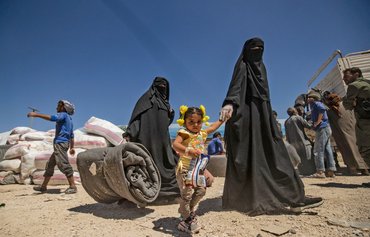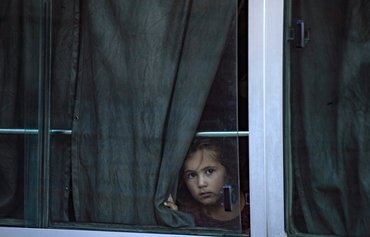The Kurdish administration that governs parts of northern and eastern Syria has announced that it intends to put "hundreds" of incarcerated "Islamic State of Iraq and Syria" (ISIS) elements on trial for their crimes.
Lawyers in the region who spoke to Al-Mashareq said they welcomed the move, as bringing criminals to justice would be important not only to the Syrian people and the Kurdish administration but also at the global level.
The ISIS elements in question are being held by the Kurdish administration in about 20 detention centres overseen by the Syrian Democratic Forces (SDF).
The trial of ISIS elements by the Kurdish administration "is a very delicate matter and requires attention to a lot of details before it can get started", said Cairo University professor of international criminal law Wael al-Sharimi.
![The Kurdish-run al-Hol camp in al-Hasakeh province, which holds relatives of suspected ISIS fighters, is seen here during a security operation by the Kurdish Asayesh forces and the special forces of the Syrian Democratic Forces, on August 26. [Delil Souleiman/AFP]](/cnmi_am/images/2023/07/05/42849-Hol-camp-Syria-600_384.jpg)
The Kurdish-run al-Hol camp in al-Hasakeh province, which holds relatives of suspected ISIS fighters, is seen here during a security operation by the Kurdish Asayesh forces and the special forces of the Syrian Democratic Forces, on August 26. [Delil Souleiman/AFP]
![A member of the Syrian Kurdish Asayesh forces stands guard during an inspection of tents at the Kurdish-run al-Hol camp, which holds relatives of suspected ISIS fighters, on August 28, as the Syrian Democratic Forces mount a security campaign against ISIS sleeper cells in the camp. [Delil Souleiman/AFP]](/cnmi_am/images/2023/07/05/42853-Asayesh-inspection-Hol-600_384.jpg)
A member of the Syrian Kurdish Asayesh forces stands guard during an inspection of tents at the Kurdish-run al-Hol camp, which holds relatives of suspected ISIS fighters, on August 28, as the Syrian Democratic Forces mount a security campaign against ISIS sleeper cells in the camp. [Delil Souleiman/AFP]
The most important detail is choosing qualified judges and teams of lawyers, he told Al-Mashareq, as well as ensuring the trials' transparency.
Also important is getting support from other countries and the United Nations (UN).
Many of the prisoners were minors fighting in the ranks of ISIS at the time they were detained but are now of age to face trial, he said, adding that their age at the time they were accused of committing crimes must be taken into account.
The Kurdish administration's decision to hold trials follows the refusal of a number of countries whose citizens are in Syria "to repatriate their citizens and try them for the crimes they are accused of", said SDF officer Farhad Khoja.
The administration began developing a plan for trials three years ago, and contacts were made with countries that have citizens detained in Syria, he told Al-Mashareq.
"The large number of detained ISIS members who are accused of terrorism is a huge financial and security burden on the [Kurdish] administration," he said.
The current holding centres and camps are overcrowded and require major effort to stop elements from spreading extremist ideology and building a new generation of terrorists, Khoja said.
Through the SDF, he added, the administration is able and prepared to provide security and transportation services for the prisoners during the trials.
Fairness and transparency
The Kurdish administration's decision to prosecute ISIS elements accused of committing crimes is necessary and long overdue, Syrian lawyer Bashir al-Bassam told Al-Mashareq.
Although the detainees are facing terrorism related charges, they should have fair and transparent trials, he said, "and inviting international agencies and Western countries to participate in the trials would ensure their fairness".
The real problems will begin when sentences are issued, as a need for "real prisons" would arise, he said, rather than the detention centres where the accused members are currently held.
This is particularly salient as the duration of sentences handed down could be up to 20 years or even life in prison, al-Bassam said.
The Kurdish administration has appealed to the UN and international human rights organisations to help it facilitate the trials. And it has continued to call for an international tribunal for the ISIS fighters held in areas it controls.
Repatriation continues
Meanwhile, the repatriation of ISIS foreign fighters and their relatives continues.
France on Tuesday (July 4) repatriated 10 women and 25 children being held in camps in northeast Syria.
It was the fourth repatriation operation over the past year for relatives of suspected ISIS fighters, the foreign ministry said.
The minors returned Tuesday will be handed over to child care services while the adults will be handed over to the relevant judicial authorities, the ministry said in a statement.
Three of the women, already sought under international arrest warrants, have been jailed on terrorist conspiracy charges, the country's anti-terrorism prosecutors' office said.
The United States in early June pledged $148 million for stabilisation efforts in Iraq and Syria as it joined Saudi Arabia in a call for the further repatriation.
US Secretary of State Antony Blinken applauded countries that have brought home their nationals from Syria --- among them Iraq, Germany, France, Belgium and Tajikistan -- urging other nations to follow suit.
"Repatriation is critical" to reduce populations of large informal camps such as Syria's al-Hol, which houses 10,000 foreigners, including ISIS relatives, he said.
"Failure to repatriate foreign terrorist fighters risks the possibility that they could again take up arms and attempt to restore" the ISIS proto-state, he added.

![A member of the Syrian Democratic Forces stands near imprisoned ISIS elements in a prison in al-Hasakeh province on October 26, 2019. [Fadel Senna/AFP]](/cnmi_am/images/2023/07/05/42792-Syria-ISIS-SDF-600_384.jpg)






